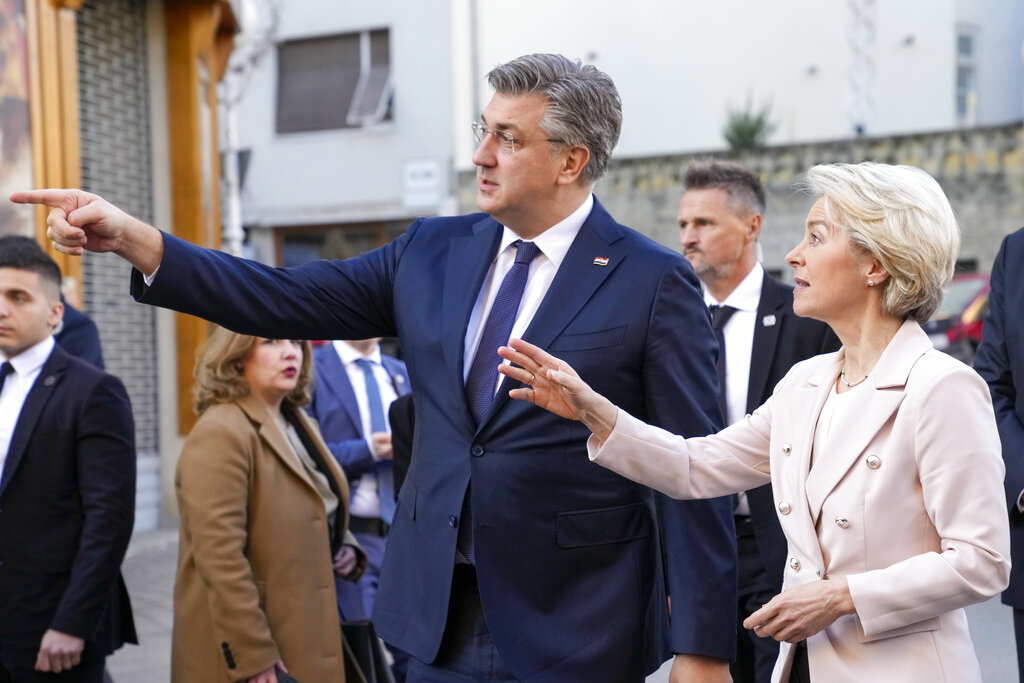Croatia’s decision to give up its currency in favor of the euro and join the EU’s border-free Schengen zone already has its critics, including right-wing Confederation Party leader Krzysztof Bosak.
“Today, another European country has lost the basic attribute of sovereignty: the ability to conduct monetary policy and influence its financial market. The Croatian government renounced its own currency, adopted the euro and thus brought the country under the authority of the central bank from Frankfurt am Main,” said Confederation Party leader Krzysztof Bosak.
Critics of the eurozone have argued it takes monetary policy powers away from nation-states and transfers them to the European Central Bank, which is headquartered in the German city of Frankfurt.
The decision to embrace the euro currency was extremely damaging to countries like Spain, Greece, and even Italy. Upon the introduction of the euro, the far more dominant northern European manufacturing sector no longer had to worry about these southern countries reducing the value of their currencies to prop up their manufacturing sectors. In addition, these southern nations had to compete with cheap exports from Asian nations, which also artificially kept their currencies cheap through the power of currency devaluation. Spain, Greece, and even Italy have since seen their manufacturing sectors severely weakened and youth unemployment has remained extremely high.
[pp id=45314]
Countries like Hungary, Poland, and Czechia, which kept their own currencies, have retained strong manufacturing and export sectors. However, all three countries are struggling with various degrees of inflation, in part because their weaker currencies make imported goods valued in euros and dollars far more expensive.
EU leaders praise Croatia
For now, politicians from Europe’s left-liberal bloc are celebrating the fact that only 10 years after joining the European Union, the former Yugoslav republic — which gained independence in 1991 — joined both the eurozone and the Schengen border-control-free area on Jan. 1, 2023. Both the country’s leaders and EU officials hailed the double achievement as recognition of the strides the country of just under 4 million has made in recent years.
Croatia’s accession to the euro area and its entry into the Schengen zone is a testament to the country’s hard work and commitment, said European Commission President Ursula von der Leyen on Sunday at the Slovenian-Croatian border crossing in Bregana, where she was accompanied by Croatian Prime Minister Andrej Plenković, Slovenian President Nataša Pirc Musar, the foreign ministers of the countries concerned, and European Commission Vice-President Dubravka Šuica, to mark the lifting of border controls.
At her press conference, von der Leyen discussed the importance of the moment in Croatia’s history. Europe will work to protect the Schengen Area, which is constantly being put to the test, according to Hungarian news outlet Magyar Hirlap.
Addressing Zagreb, the Commission president said Schengen is a matter of commitment and mutual trust: “We are interdependent within the zone, but we know we can trust you and rely on you.”
Prime Minister Andrej Plenković said that Jan. 1, 2023 is a historic day on which Croatia’s strategic political goals have been achieved. He pointed out that Croatia, which is the only country to have joined the euro area and the Schengen zone on the same day, is now one of the 15 European countries that are members of these two integration projects and NATO.
Plenković thanked the ministers working to achieve these goals and the police guarding the border. He said that the police were ready to protect the more than 1,350 kilometers of the external EU-Schengen border. But Croatia will not build a fence on the border and will stick to this principle, he said.
Croatia’s ascension into Schengen is seen as a bright spot for conservatives like Hungarian Prime Minister Viktor Orbán, as it is seen as a new opportunity to defend Europe’s external border.
“We are celebrating Croatia’s membership of Schengen because this will allow us to transfer a live force from the Croatian-Hungarian border, which has also had to be protected up to now, to the Hungarian-Serbian border. This means that we will be more effective than we were,” Orbán said earlier this week.






